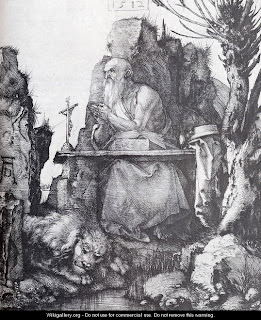The pollarded plane trees along London's streets
really intrigue me. Is it the quest for negative space? The force of nature at work, spurred into greater action by the violence done to the tree's growing points? Is it a signal of persistence in the struggle against all odds?
In terms of art inspiraton, is it the quest for negative space? The structures feel random, yet nature isn't random, it's all systems; growth is charted in an organism's genes, and amputation doesn't change that system.
Maybe it's simply a memory of the
Struwwelpeter story, read to me by my grandmother -
 |
| A merry tale (image from here) |
While we're on the subject, here are some pollarded trees in art -
 |
| Pollarded Willows with Setting Sun by Vincent Van Gogh (image from here) |
 |
| St Jerome by the Pollard Willow by Durer (image from here) |
 |
| Pollarded Trees by Robert Tavener (linocut; image from here) |
 |
| Pollarded Trees, Hotel Dieu, Toulouse by Lesley Trussler (lino cut and collage; image from here) |
 |
| Robert Burkert, Pollarded Tree (lithograph, 1968; image from here) |
 |
| Willownest by Nils Udo, 1994 (image from here) |
 |
| Frances Hodgkins, Country Scene with Pollarded Trees and Wooden Gate, c1933 (image from here) |
 |
| Installation by Patrick Doughtery in San Francisco, 2009 (image from here) |
 |
| Road with Pollarded Willows and a Man with a Broom by Vincent Van Gogh (image from here) |
 |
| St Jerome beside a Pollarded Willow by Rembrandt (image from here) |













No comments:
Post a Comment